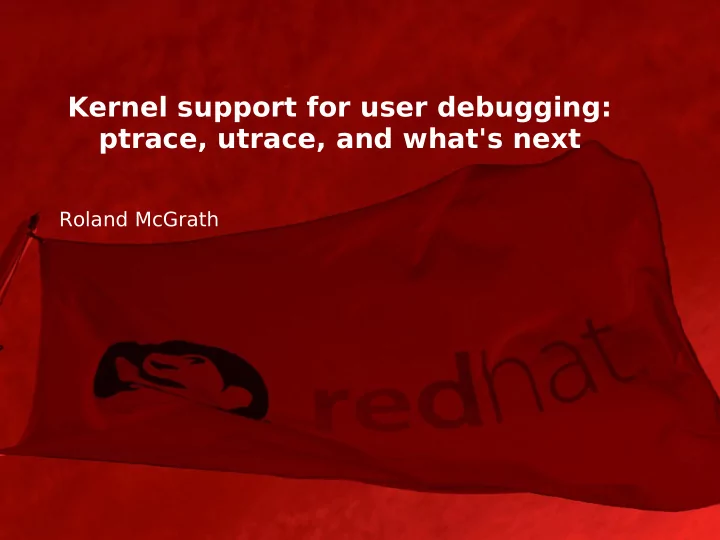

Kernel support for user debugging: ptrace, utrace, and what's next Roland McGrath
Kernel support for user debugging What is ptrace? What is wrong with ptrace? What we do about it? ● How do we support the next generation of tracing and debugging tools? ● How do we get more hackers playing in this space? ● New tracing API layer inside the kernel: utrace
What is ptrace? how one process traces & debugs others ● used by all debugger applications (GDB, strace, etc.) from old BSD, repeated in Linux (interface 25+ years old) ● ptrace() function interface, tweaked over the years ptrace facilities ● s top on events ● get/set user registers ● read/write user memory (also /proc/pid/mem) ● single-step/branch-step ● h/w debug facilities
ptrace interface ptrace() function, <sys/ptrace.h>, <linux/ptrace.h> ~30 requests (0-2 args), 7 option bits always one thread at a time thread must be stopped (except PTRACE_ATTACH) once attached, debugger gets SIGCHLD, waitpid() event reports via pseudo-signal stop
What is wrong with ptrace? Userland perspective: interface changes behavior of traced processes ● attach/detach interrupts system calls ● overloads signals low throughput, high latency one tracer all-or-nothing security model no fun to program ● clunky syscall interface ● SIGCHLD/waitpid() difficult to use ● too many races, corner cases ● poor fit for application event loops ● ad hoc arch requests
What is wrong with ptrace? Kernel perspective: implementation fragile kernel internals, poorly documented ● task parent link, reparenting on exit/detach ● waitpid() special cases ● scattered magic checks arch code ● poor separation of arch from generic ● cut'n'paste maintenance
What do we do about it? clean up ptrace internals some ● still maintaining it build new infrastructure inside the kernel ● arch uniformity ● layered approach, bottom up ● not one-size-fits-all ● well-specified tracing layer inside the kernel (utrace) ● not just one new different user-level interface
arch internals cleanup ptrace arch cleanups (2.6.25, 2.6.26) ● arch_ptrace ● compat_arch_ptrace step (2.6.25) #define arch_has_single_step() (1) #define arch_has_block_step() (cpu_has_bt) void user_enable_single_step(struct task_struct *task); void user_enable_block_step(struct task_struct *task); void user_disable_single_step(struct task_struct *task); asm/syscall.h (2.6.27)
user_regset (2.6.25) standardize formats: core ELF note type shared arch code for debug/core uniform interface for extension: NT_386_TLS, NT_PPC_* interface details: <linux/regset.h> ● struct user_regset_view, task_user_regset_view() ● e_machine, ..., n, regsets[] ● struct user_regset ● fields: n, size, core_note_type, ... ● functions ● get ● set ● active ● writeback
<linux/tracehook.h> (2.6.27) well-specified calls from arch/core code ● Kerneldoc comments, explain context (locking, etc.) core hooks ● exec, clone, signals, exit, death, reap arch hooks ● system call entry, exit ● signal handler setup TIF_NOTIFY_RESUME ● new arch support for noninvasive tracing
Architecture status 2.6.25: user_regset, step (x86, powerpc, ia64, sparc64) 2.6.27: powerpc, sparc64 2.6.28: x86, s390
utrace What is utrace? ● in-kernel API (for kernel modules) ● multiplexing layer (not just one new kind of tracing) What is utrace not? ● ptrace replacement ● new user-level interface ● ptrace() is a user syscall; utrace is an in-kernel API ● solution to “What's wrong with ptrace?” Then what is that good for? ● platform for new solutions ● can implement compatible ptrace() using it ● means to build new interfaces + other new features
utrace goals Establish platform for new work ● API for kernel modules ● allows multiple separate uses: “tracing engines” ● bottom layer, usable by non-gurus ● block_device:fs :: utrace:tracing engine ● net_device:net proto :: utrace:tracing engine Help you do it right ● non-invasive (no interference with signals, wait, etc.) ● low-overhead ● arch-independent ● maintain system invariants (SIGKILL)
utrace API concepts tracing engine = your code, calls into utrace API API calls are per-thread (aka task) asynchronous attach/detach ● “attached engine” pointer is handle event callbacks (in traced thread) control ● stop ● resume, step, interrupt, report ● detach report & quiesce: explicit synchronization via callbacks
utrace events SYSCALL_ENTRY, SYSCALL_EXIT ● entry/exit distinguished, unlike ptrace SIGNAL SIGNAL_IGN, SIGNAL_STOP, SIGNAL_TERM, SIGNAL_CORE ● signal disposition distinguished, unlike ptrace EXEC CLONE JCTL ● not possible with ptrace EXIT, DEATH REAP ● not possible with ptrace QUIESCE ● pseudo-event, used with UTRACE_REPORT et al
utrace API struct utrace_engine_ops ● callback function pointers for each event type struct utrace_attached_engine ● void *data ● utrace_engine_get() / utrace_engine_put() struct task_struct vs struct pid ● choose your refcount/RCU poison enum utrace_resume_action utrace_attach_task() or utrace_attach_pid() ● attach new engine, or look up attached engine utrace_set_events() or utrace_set_events_pid() utrace_control() or utrace_control_pid() utrace_barrier() or utrace_barrier_pid() utrace_prepare_examine(), utrace_finish_examine()
utrace callbacks run in traced thread ● always at “safe point”: no locks, can use user_regset ● preemptible arguments: engine, resume action, + event-specific return value ● resume action (resume/stop/step/etc.) + event-specific well-behaved callbacks ● don't run too long (using traced thread’s CPU time!) ● don't block much (could break other engines, SIGKILL!) ● use UTRACE_STOP to sleep: woken via utrace_control() synchronizing with callbacks ● death races: utrace_set_events()/utrace_control() errors ● utrace_barrier()
Callback example static u32 syscall_exit(enum utrace_resume_action action, struct utrace_attached_engine *engine, struct task_struct *task, struct pt_regs *regs) { printk("pid %d syscall-exit %ld\n", task->pid, syscall_get_error(task, regs)); return UTRACE_RESUME; } ... static const struct utrace_engine_ops my_ops = { .report_syscall_exit = syscall_exit, }; ...
utrace API future work extension events ● avoid overloading signals ● use for hardware trace events ● dynamically-registered ● tie-in with tracepoints/markers? hw_breakpoint engine callback order global tracing (?) ● redundant with tracepoints/markers, so maybe not ● global syscall tracing arch improvements ● optimize x86 syscall tracing ● powerpc block-step
Beyond utrace: lots of hacking to do! User-level interfaces ● fd-based, pollable ● minimize kernel-user round-trips with debugger “groups & rules” engine ● Underlies user-level interface + in-kernel uses (stap) ● Trace many threads/processes uniformly (“groups”) ● Event rules: filters & actions ● Gather details (registers, etc.) & report to userland ● Callback (e.g. to stap probe) ● Manage groups (e.g. on clone, exec) Instruction-copying machinery, for: ● Breakpoint assistance ● Step emulation without hardware support ● Step over atomic sequence, e.g. powerpc locks
Questions? roland@redhat.com | people.redhat.com/roland utrace-devel@redhat.com | sourceware.org/systemtap/wiki/utrace
Recommend
More recommend